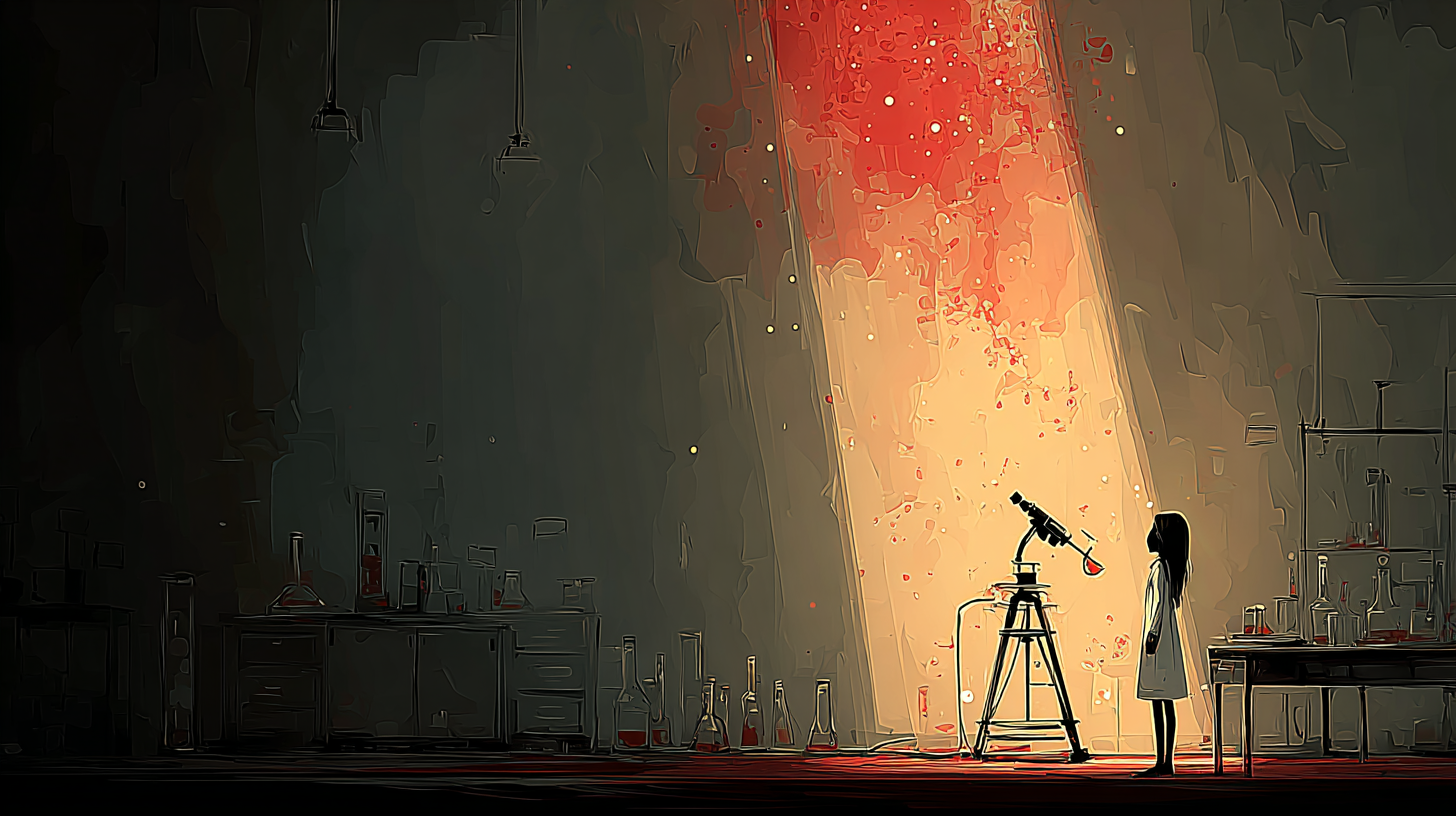A particle is a very small piece of something or a small word that adds meaning in a sentence.
とても小さなかけらや少しだけのもの、または文の中で意味を足す小さな単語のこと。
以下は英単語 “particle” に関するストーリー型学習コンテンツです。まずは大枠の意味を理解して最後の文章で確認しましょう。
「particle」の主な意味(main meaning)
| 品詞 | 意味(簡潔定義) | 例文 | 発音記号(IPA) |
|---|---|---|---|
| 名詞 | 非常に小さな部分、粒子 | A particle of dust floated in the air. | /ˈpɑːr.t̬ɪ.kəl/ |
| 名詞 | ごくわずか、少量 | He didn’t show a particle of emotion. | /ˈpɑːr.t̬ɪ.kəl/ |
| 名詞 | 小詞(文法上の単語の一種、助詞など) | In the phrase “give up,” “up” is a particle. | /ˈpɑːr.t̬ɪ.kəl/ |
「particle」の語源(etymology)
語源:ラテン語 particula(小さな部分)から。
コアイメージ:「とても小さな部分・かけら」
「particle」の類義語(synonyms)
| 類義語 | 例文 |
|---|---|
| speck | There was a speck of dust on the mirror. |
| grain | A grain of sand got into my eye. |
| bit | Can I have a bit of chocolate? |
| fragment | He found a fragment of ancient pottery. |
| trace | There was a trace of sadness in her voice. |
「particle」の反義語(antonyms)
| 反義語 | 例文 |
|---|---|
| whole | He ate the whole cake by himself. |
| mass | The mass of clouds blocked the sun. |
「particle」のコロケーション(collocations)
| コロケーション | 例文 |
|---|---|
| a particle of dust | A particle of dust landed on the book. |
| a tiny particle | Scientists studied a tiny particle under the microscope. |
| particle physics | He is studying particle physics at university. |
| lose every particle of hope | She lost every particle of hope after the accident. |
| invisible particles | The air contains invisible particles. |
「particle」の2項表現(binomials)
| 2項表現 | 例文 |
|---|---|
| bits and particles | The machine broke into bits and particles. |
| dust and particles | Dust and particles filled the old room. |
英語ストーリー(english story)
Title: The Mystery in the Lab
Kenji was an intern at a science lab during his summer break. One day, Dr. Smith asked him to clean the microscope lenses. As he wiped the surface, he noticed a tiny particle moving under the lens. Curious, he called Dr. Smith.
“This is interesting,” she said. “It might be a new particle we’ve never seen before.”
Kenji was excited. He had only expected to clean equipment, but now he was part of something important.
Later that day, they ran tests in the particle physics lab. The scientists believed this tiny particle could help explain some mysteries about the universe. Although it was invisible to the naked eye, the machines could track it.
“I can’t believe such a small thing could be so important,” Kenji said.
Dr. Smith smiled. “Sometimes, the smallest particles have the biggest impact.”
Over time, Kenji became more confident. He learned about specks, grains, and fragments, and how even a trace of something could lead to big discoveries.
He also learned that science requires patience. Not every day brought excitement. Sometimes, they lost every particle of hope, but they never gave up.
By the end of the summer, Kenji didn’t just clean the lab. He helped discover a whole new idea.
和訳
タイトル:研究室の謎
ケンジは夏休みに科学研究所でインターンをしていた。ある日、スミス博士が彼に顕微鏡のレンズを掃除するよう頼んだ。表面を拭いていると、レンズの下で**とても小さな粒子(particle)**が動いているのを見つけた。興味を持ったケンジはスミス博士を呼んだ。
「これは興味深いわね」と彼女は言った。「もしかしたら、今まで見たことのない新しい**粒子(particle)**かもしれないわ」
ケンジはワクワクした。ただの掃除だけのはずが、重要な発見に関われることになったのだ。
その日の午後、彼らは**素粒子物理学(particle physics)の研究室で実験を行った。科学者たちは、この小さな粒子(tiny particle)が宇宙の謎を解く手がかりになるかもしれないと考えていた。肉眼では見えない粒子(invisible particle)**だったが、機械で追跡できた。
「こんなに小さいのに、こんなに重要だなんて信じられない」とケンジは言った。
スミス博士は笑った。「ときには、一番小さな**粒子(particle)**が一番大きな影響を与えるのよ」
時が経つにつれ、ケンジは自信をつけていった。微粒(speck)、砂粒(grain)、**断片(fragment)などを学び、わずかな痕跡(trace)**が大きな発見につながることも知った。
また、科学には忍耐が必要だと学んだ。毎日が興奮の連続ではない。時には**すべての希望を失いそうになる(lose every particle of hope)**こともあるが、決して諦めなかった。
夏の終わりには、ケンジはただの掃除係ではなかった。彼は**全く新しい(whole)**考えを発見する手助けをしていたのだった。
「particle」のQ&A
- Q粒子(particle)の類義語「speck」とはどう違いますか?
- A
「speck」は非常に小さな点やシミなど、目に見えるごく小さいものを指します。「particle」も小さいものを指しますが、科学や抽象的な意味で使われることが多いです。
- Q「grain」と「particle」は同じ意味ですか?
- A
「grain」は「粒(つぶ)」のように、砂や米などの小さくて硬いものに使われます。「particle」はもっと科学的な文脈で、目に見えないような小さな粒子にも使われます。
- Q「bit」は「particle」と置き換えられますか?
- A
「bit」はもっとカジュアルで広い意味の「少し・一部」を表す言葉です。科学や厳密な場面では「particle」のほうが適しています。
- Q「fragment」と「particle」はどう違いますか?
- A
「fragment」は「壊れた破片」のように、何かが壊れてできた一部を表します。「particle」は最初から非常に小さな存在で、壊れてできたとは限りません。
- Q「trace」は「particle」と似ていますか?
- A
「trace」は「ほんのわずかな痕跡」を意味します。量としては「particle」よりもさらに少ないこともあり、見えないことも多いです。
- Q「mass」は「particle」の反対語ですか?
- A
はい。「mass(塊)」は大きくてまとまった物体を指すのに対し、「particle」は非常に小さな部分を表します。大きさで正反対の関係になります。
- Q「whole」と「particle」はどう反対なのですか?
- A
「whole(全体)」は完全なひとつのものを指します。「particle」はその中のごく小さな一部分という意味で、「全体 vs 一部」の関係になります。
- Q「a particle of dust」のような使い方はどういう意味ですか?
- A
「a particle of dust」は「ほこりの小さな一粒」という意味で、非常に小さな単位を強調した表現です。よく日常でも使われます。
- Q「tiny particle」はよく使われる表現ですか?
- A
はい。「tiny particle」は「とても小さな粒子」という意味で、科学の話や細かい描写でよく使われます。物の小ささを強調する定番表現です。
- Q「particle physics」とは何ですか?
- A
「particle physics(素粒子物理学)」は物質を構成する最も小さな粒子について研究する学問です。高校や大学で学びます。
- Q「invisible particles」とは何ですか?
- A
「invisible particles」は「目に見えない粒子」という意味で、空気中の微粒子やウイルスなどを指すことが多いです。
- Q「lose every particle of hope」とはどんな意味ですか?
- A
「lose every particle of hope」は「希望のかけらさえも失う」という意味で、完全に絶望する様子を表す表現です。
particle / speck / grain / fragment / bit / trace の違い
| 単語 | 意味 | ニュアンス | 例文 |
|---|---|---|---|
| particle | 非常に小さな部分・粒子 | 科学的・抽象的文脈で使う | A particle of dust floated in the air. |
| speck | 小さな点・シミ | 目に見えるごく小さいもの | There was a speck of dirt on the lens. |
| grain | 粒(米・砂など) | 小さくて硬い粒子 | A grain of sand got into my shoe. |
| fragment | 破片・断片 | 壊れたものの一部 | He found a fragment of glass on the floor. |
| bit | 少し・一部 | カジュアルで広い意味 | Can I have a bit of chocolate? |
| trace | 痕跡・わずか | ほとんど感じられない量 | There was a trace of sadness in her eyes. |



コメント